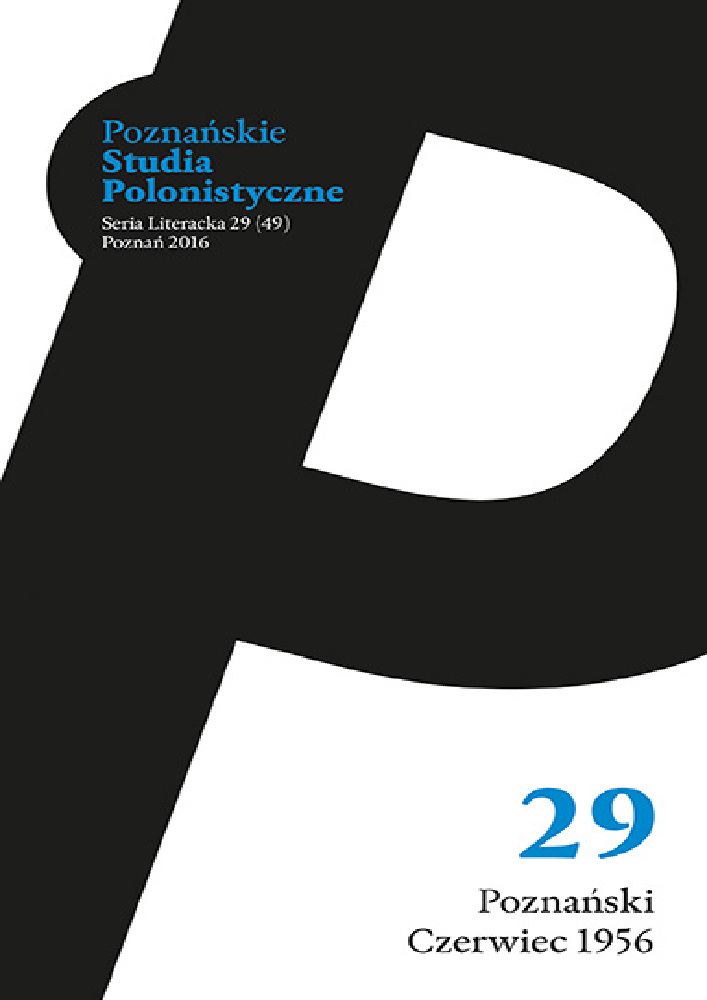Abstract
The article begins with the statement based on current research, that Poznań 1956 protests are little represented in literature. Subsequently, the article analyses the construction of character and temporal composition of several novels about the Poznań 1956 protests. The novels are arranged chronologically and divided into two parts: censored ones and those published without official approval and censorship. The first group includes Jeszcze miłość by Bogusław Kogut, Odyseja, odyseja by Marian Grześczak and Wióry by Krystyna Kofta. The second group includes Krótki żywot bohatera pozytywnego by Piotr Guzy, Ciemnia by Bogusława Latawiec, Krew by Andrzej Górny, and Węzeł by Józef Ratajczak. The first group, true to the course of history, represent the rise of the political thaw and the party regaining control over situation. The second group, because of the time of writing, cover a longer time and tend to universalize the theme. In novelistic representations of Poznań 1956 protests there are two strains: uprising-themed and strike-themed. It turns out that the latter is the least present, because most novelistic characters are party-members and intelligentsia, whereas workers and ordinary people are relegated to the background. Plotlines are arranged biographically, not chronologically, because the novels are narrated as internal monologues with retrospective memories. The novels written by authors from Poznań, or related to Poznań, focus on the provintial character of the city, as opposed to the centralist influence of Warsaw.References
Danilewicz-Zielińska Maria (1992), Szkice o literaturze emigracyjnej, Zakład Narodowy im. Ossolińskich, Wrocław.
Fik Marta (1989), Kultura polska po Jałcie. Kronika lat 1944-1981, Wydawnictwo Polonia, London.
Górny Andrzej (1991), Krew, Oficyna Opcja, Poznań.
Grzelczak Piotr (2016), Poznański Czerwiec. Walka o pamięć w latach 1956-1989, Wydawnictwo Nauka i Innowacje, Poznań.
Grześczak Marian (1979), Odyseja, odyseja, Czytelnik, Warszawa.
Guzy Piotr (2015), Krótki żywot bohatera pozytywnego, Wydawnictwo
Nowik, Opole.
Kofta Krystyna (1980), Wióry, Czytelnik, Warszawa.
Kogut Bogusław (1967), Jeszcze miłość, Wydawnictwo Literackie, Kraków.
Latawiec Bogusława (1995), Ciemnia, Zysk i S-ka, Poznań.
Machcewicz Paweł (2006), Miejsce Poznańskiego Czerwca w historii Polski i Europy Środkowej, w: Poznański Czerwiec ’56. Sens pamięci, Wydawnictwo Naukowe UAM, Poznań.
Maciejewski Jarosław, Trojanowiczowa Zofia, red. (1990), Poznański Czerwiec 1956, wyd. 2, Wydawnictwo Poznańskie, Poznań.
Nowak Jan (Zdzisław Jeziorański) (1990), Krwawy Czwartek Poznański, w: Poznański Czerwiec 1956, red. Jarosław Maciejewski, Zofia Trojanowiczowa, wyd. 2, Wydawnictwo Poznańskie, Poznań.
Ratajczak Józef (1996a), Powieść w „zasięgu cenzury”, Wydawnictwo WiS, Poznań.
Ratajczak Józef (1996b), Węzeł, Wydawnictwo WiS, Poznań.
Sterna-Wachowiak Sergiusz (1995), Symbol i rana: Czerwiec 1956 w poezji i prozie, „Kronika Miasta Poznania”, nr 4, s. 61-95.
Wolicki Krzysztof (1990), fragment wywiadu, „Czas” 1986, nr 6/7, w: Poznański Czerwiec 1956, red. Jarosław Maciejewski, Zofia Trojanowiczowa, wyd. 2, Wydawnictwo Poznańskie, Poznań.
License
Authors
Authors of texts accepted for publication in „Poznańskie Studia Polonistyczne. Seria Literacka” are required to complete, sign and return to the editor's office the Agreement for granting a royalty-free license to works with a commitment to grant a CC sub-license.
Under the agreement, the authors of texts published in „Poznańskie Studia Polonistyczne. Seria Literacka” grant the Adam Mickiewicz University in Poznań a non-exclusive, royalty-free license and authorize the use of Attribution-NoDerivatives 4.0 International (CC BY-ND 4.0)Creative Commons sub-license.
The authors retain the right to continue the free disposal of the work.
Users
Interested Internet users are entitled to use works published in „Poznańskie Studia Polonistyczne. Seria Literacka” since 2016, for non-commercial purposes only, under the following conditions:
- attribution - obligation to provide, together with the distributed work, information about the authorship, title, source (link to the original work, DOI) and the license itself.
- no derivatives - the work must be preserved in its original form, without the author's consent it is not possible to distribute the modified work, such as translations, publications, etc.
Copyrights are reserved for all texts published before 2016.
Miscellaneous
Adam Mickiewicz University in Poznań retains the right to magazines as a whole (layout, graphic form, title, cover design, logo etc.).
